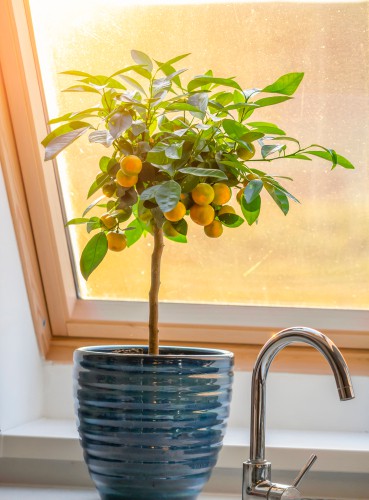Last updated on March 30th, 2022
Our site is reader supported, this means we may earn a small commission from Amazon and other affiliates when you buy through links on our site.
Citrus trees are not native to Britain, but you can grow them successfully in containers. You can leave them outside in the summer and bring them inside for the winter. Most gardeners love growing lemons, calamondins and kumquats are also tolerant of cold weather. Those in slightly warmer regions can cultivate limes or grapefruits, even oranges. No matter what type of citrus tree you grow, it’s essential that you know how to feed and water it appropriately because overwatering is the biggest cause of leaf drop and root rot. They are also very hungry plants and need feeding regularly with winter or summer citrus feed.
Feeding citrus trees
When you first plant your citrus tree, you should give it a hefty dose of fertiliser according to the instructions on the citrus fertiliser you choose. This will help it to adjust to its new location.
Summer and winter feeds
- HIGH NITROGEN CONTENT TO SUPPORT GROWTH AND IMPROVE FRUITING: Vitax Summer Citrus Feed ensures robust plant development and enhances the quality and quantity of citrus fruits like lemons, kumquats, and limes. "
- Discourages premature ripening, fruit drop and leaf discolouration
- Apply weekly from April to September
- IDEAL FOR PLANTS GROWING IN POTS OUTDOORS IN SUMMER AND INDOORS IN WINTER: Allows for flexible cultivation of citrus plants, ensuring they receive the necessary care and environment throughout the year.
- SUITABLE FOR VARYING CONDITIONS: Vitax Summer Citrus feed is suitable for citrus requiring differing climate conditions, making it a great choice for hardier lemons as well as those requiring warmer year round conditions
- Carefully balanced to maintain growth
- Helps prevent premature leaf fall and discolouration
- Apply weekly from October to March
While you are maintaining your citrus tree, you should be adding fertiliser 1-2 times per year, possibly more depending on the citrus tree you have and what it needs specifically based on where you live. Citrus plants are very hungry trees, and they need a lot of food. You should give them high nitrogen, Citrus specific fertiliser, usually sold as summer citrus feed between March and October. In winter you need a winter feed for citrus plants and apply less frequently but as stated on the fertiliser, it can vary from brand to brand.
- easy to use
- no mess
- no measuring
- lasts 15 days
- lasts up to 15days
Feeding after repotting into larger pots
Most citrus trees have to be transplanted to larger pots as they grow toward maturity. This is something you might do every 3 or 5 years, depending on the type of citrus tree you are growing. When you transplant your citrus to a new container, you want to follow that same rule of feeding. Give it a hefty dose of fertiliser according to the instructions to help it adjust to the new container and get settled in.
Watering citrus trees
Watering is equally important. Citrus trees love an abundance of sunshine and the more sun they get, the faster the soil will dry out. You should be watering on average once per week, possibly 2-3 times per week when the weather is particularly warm.
A good rule is to check the soil before you water it. If the soil is dry to the touch, it’s indicative of dry soil in need of a refresher. Even in the winter, if you bring your citrus tree indoors, it still needs to be watered just much less often.

Avoid overwatering
Citrus trees are particularly susceptible to damage from overwatering; they can become waterlogged, which will cause root rot. It is, for this reason, you want to check the soil before you water it so that you can adjust accordingly. When growing in a container, you need not water for more than 30 seconds at a time, especially if the plant is indoors. In fact, when you bring your plant indoors for the winter, you might consider misting it gently to avoid over-watering during the colder months. As a guide, you might water daily in summer but as little as once or twice a month in winter, sometimes even longer between watering.
Always check the container itself for adequate drainage and maybe when you transplant your citrus tree, add some gravel to the bottom of the container to help with proper drainage.
Right after you plant your citrus tree, and anytime you transplant it to a larger container, you should water it thoroughly to help the tree settle into its new home.
Following these steps will help you to ensure the long lifespan of your citrus tree so that you can pick fresh fruit every year.
Last update on 2025-03-31 / Affiliate links / Images from Amazon Product Advertising API





